

Happiness. Bit of a masterpiece, like a whole movie in a Tik Tok clip. Is the teen rebel a dying breed? Image copyright Thinkstock My son has just turned 13 and I made him a card to mark the moment he became a teenager.
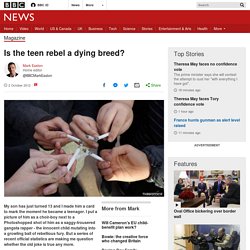
I put a picture of him as a choir-boy next to a Photoshopped shot of him as a saggy-trousered gangsta rapper - the innocent child mutating into a growling ball of rebellious fury. But a series of recent official statistics are making me question whether the old joke is true any more. Teenage rebels are not what they were. Adolescents are increasingly turning their noses up at drugs, booze and fags, with consumption by young people the lowest at almost any time since we started measuring these things. Drugs: Last week, the Home Office published analysis which suggests the proportion of 16- to 24-year-olds that have ever taken illicit drugs has fallen from 54% in 1998 to 38% now. Tobacco: Last month, NHS analysis suggested the proportion of English 16- to 19-year-olds who have never smoked has risen from about two-thirds in 1998 to three-quarters now.
So what is going on? Pupils suffering from anxiety and depression to receive counselling in schools. Children suffering from anxiety and depression will be offered counselling at school under government plans to tackle a widely reported crisis in young people’s mental health.

Pupils in England will be able to attend sessions with therapists at school or college in an attempt to stop any psychological difficulties deepening into lifelong issues. Every school will also be required to appoint a teacher to co-ordinate improved support for the fast-growing number of children who are struggling mentally, many self-harming as a result of bullying, exam stress, dissatisfaction with their body shape, troubles at home and other factors. The plans are included in a government green paper to be launched on Sunday by health secretary Jeremy Hunt and education secretary Justine Greening. A new guaranteed maximum four-week waiting time for children with more complex problems to access NHS child and adolescent mental health services (Camhs) will be phased in. Brutally Honest Illustrations About Modern Life By The World’s Most Cynical Artist. Is life for teenagers nowadays easier than before?
Tennagers lives are 100% not easy Now these days we have social media.

Which to us is an important part of our lives now. But there is downsides in the fact that we are exposed to things that our parents back then weren't exposed to, such as people being able to bully us without being caught. Also with all the pictures of models and things on social media where when you look at them it makes you feel like you aren't pretty enough. Then there is school, where I am pretty sure back then they didn't have to do as much as what we have to do now. We have to go through things like studying almost 24/7 we have to keep up a popularity status (if you're someone who cares about that).
The Catcher and the Rye by seamus hall on Prezi. Symbolism in Catcher in the Rye by Diane Hu on Prezi. Who Wrote Holden Caulfield? The lead singer Billy Joe Armstrong wrote the song about Holden and his connection to the character.
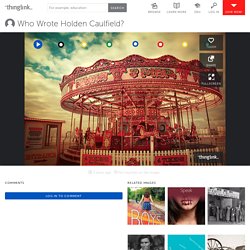
When he says "Someone help him up or he's gonna end up quitting" it is a very good representation of Holden and his depression. This also hints at suicidal thoughts and actions. "I shuffle through my mindTo see if I can findThe words I left behind" is Holden's attempt to recall moments where he left things unsaid, especially to Allie before he died. Holden is very depressed and has "no motivation" as said in the song. Holden does not feel motivated because of his depression, and he also knows if he becomes motivated he is going to have to grow up.
The Catcher in the Rye Chapter 23 Audiobook. The illustrator whose work perfectly sums up what it is really like to be a woman. From running with boobs and dealing with an unexpected periods to taking inspiration from Cleopatra and artist Frida Kahlo, illustrator Nina Cosford has captured the paradoxes that make being a young woman in the 21st century a nightmare but fun nonetheless.

Cosford, who is based in the south eastern UK town of Hastings, grew up doodling and drawing: whether copying cartoons or sketching “dodgy self-portraits”, she told The Independent. My Name is Girl - In pictures Now 28, she has caught the eye of writer Lena Dunahm with her depictions of her HBO series Girls recently published her first book: My Name is Girl: An Illustrated Guide to the Female Mind. Her honest and humorous work is semi-autobiographical, but will resonate on a certain level with women everywhere. The Praises and Criticisms of J.D. Salinger's The Catcher in the Rye. Ever since its publication in 1951, J.D.
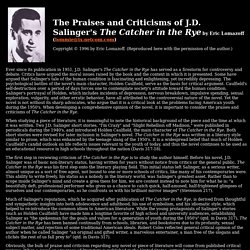
Salinger's The Catcher in the Rye has served as a firestorm for controversy and debate. Critics have argued the moral issues raised by the book and the context in which it is presented. Some have argued that Salinger's tale of the human condition is fascinating and enlightening, yet incredibly depressing. The psychological battles of the novel's main character, Holden Caulfield, serve as the basis for critical argument. Caulfield's self-destruction over a period of days forces one to contemplate society's attitude toward the human condition. The Catcher in the Rye, Part 2. Catcher in the Rye, Part 1. Some Thoughts on The Catcher in the Rye. Academic About movies/music/tv, pop culture/trends, school/college and social issues/civics. J.D.
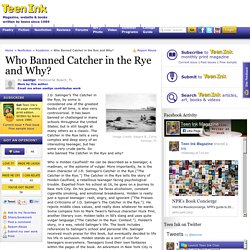
The Catcher in the Rye Chapter 10 Summary & Analysis from LitCharts. The Catcher in the Rye, Chapters 10 – 15. Here are the yay/nay/gray thoughts of the day for the next segment of Catcher in the Rye: In Chapter 11, Holden reveals some of his past history with Jane.

He says, “You don’t always have to get too sexy to get to know a girl” (76). He reveals an intimacy with Jane that isn’t sexual. Jane listens to his story about Allie, and they play checkers on her porch, and Holden asks about the creepy step-dad. Holden explains his feelings about Jane: “My mother didn’t think Jane was pretty, even. Spoiler alert: Holden doesn’t sleep with the prostitute: “It was against my principles and all, but I was feeling so depressed I didn’t even think. In chapter 15, Holden goes on and on about suitcases, which seem to be a status symbol for him. Holden can be sweet and sincere sometimes, such as when he talks about Jane. Sometimes he seems totally indifferent, and sometimes he is nice, and sometimes he is a jerk.
More {silly} Questions: Catcher in the Rye Flashcards. OMFG CATCHER IN THE RYE!!! Banned from the classroom: Censorship and The Catcher in the Rye - English and Drama blog. By Mercedes Aguirre, Lead Curator American Collections J.D.
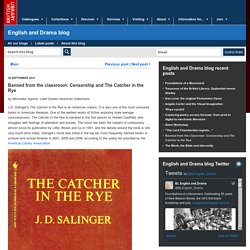
'The Catcher in the Rye' Within two weeks of its 1951 release, J.D.
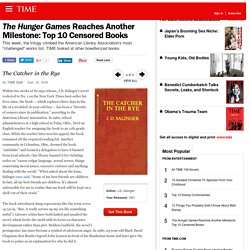
Salinger’s novel rocketed to No. 1 on the New York Times best-seller list. Banned Books That Shaped America. The Library of Congress created an exhibit, "Books that Shaped America," that explores books that "have had a profound effect on American life. " Below is a list of books from that exhibit that have been banned/challenged. (To learn more about challenges to books since the inception of Banned Books Week, check out the timeline created by ALA.) The Adventures of Huckleberry Finn, Mark Twain, 1884. Language, Voice, and Holden Caulfield: The Catcher in the Rye Part 1. "The Catcher in the Rye" ... from 60second Recap® A Date With Your Family - 1950's American Family Values / Educational Documentary.
A Date With Your Family (1950) Holden as the "Catcher in the Rye" Game. Holden, JD, and the Red Cap- The Catcher in the Rye Part 2: Crash Course English Literature #7. Video SparkNotes: J.D. Salinger's The Catcher in the Rye summary. The Catcher in the Rye - part 4 - chapters 9-12 flashcards. J.D. Salinger Doesn't Want To Talk.
American Masters: Edward Norton's Analysis of "The Catcher in the Rye" Who was J.D. Salinger? The Catcher in the Rye at 60: Ten things you should know. 1. It screwed up, majorly The novel is said to have popularised the term "screw up", as in "Boy, it really screws up my sex life something awful. My sex life stinks. " Hurrah for disaffected teenagers across the globe. 2. Salinger spent a lot of time refusing requests to adapt the novel. 3.
Salinger was working on a version of the book when he was fighting in the second world war. 4. Mark David Chapman, the killer of John Lennon, so identified with the Salinger's antihero that he wanted to change his name to Holden Caulfield. 5. Salinger could have been a meat importer – his father was a successful meat and cheese merchant who sent his son to Austria to brush up on the trade before the second world war. 6.
The American rock band Green Day are proud champions of Salinger's antihero; their 1994 song Basket Case is a nasally homage in nasally whines. 7. Salinger was dating Oona O'Neill, daughter of the playwright Eugene O'Neill, until she started seeing the comedian. 8. 9. 10. The 100 best novels: No 72 – The Catcher in the Rye by JD Salinger (1951) JD Salinger’s Holden Caulfield is to the 20th century what Huckleberry Finn is to the 19th: the unforgettably haunting voice of the adolescent at odds with a troubling world. Holden, the opposite of Huck, is an unhappy rich boy who has done a bunk from his posh secondary school, Pencey Prep, in Agerstown, Pennsylvania.
He begins his first-person narrative in words that echo the famous opening of Twain’s novel (No 23 in this series), a frank disavowal of “all that David Copperfield kind of crap”. Holden declares that he isn’t going to tell us “about this madman stuff that happened to me around last Christmas just before I got pretty run-down”. Actually, that’s just what he does, writing (apparently in retrospect from California) about three days in December 1949 when, having been chastised by his school “for not applying myself”, he plays truant over a long and memorable weekend in Manhattan. That’s just one reading.
Catcher in the Rye Will Smith monologue. The Catcher in the Rye Official Trailer (2014)